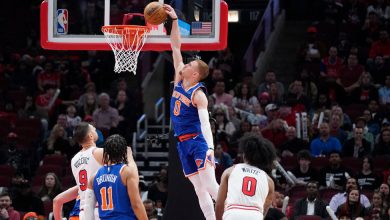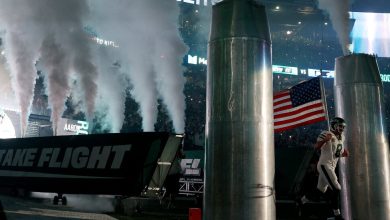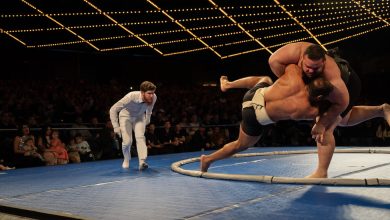Gruden’s Emails Were Collateral Damage in Washington Football Saga

The former Las Vegas Raiders Coach Jon Gruden is out of a job in the aftermath of an investigation that originally had nothing to do with him. But now he is collateral damage in a tangled case that had focused on the conduct of Daniel Snyder, the contentious owner of the Washington Football Team, and his feud with investors in the team.
Snyder has emerged with firmer control of Washington than before even after Roger Goodell, the league’s commissioner, concluded that the workplace environment at the team was “highly unprofessional” and a place of bullying, intimidation and fear. The team was fined $10 million.
A scorched-earth dispute has played out over the last year, with damning information and accusations of wrongdoing weaponized by those involved. Gruden’s high-profile football career, which made him a wealthy man and an avatar of the sport itself, meant that his misdeeds became leverage in a fight that wasn’t even directly about him.
Snyder and the Washington Football Team have long been mired in controversy, whether for the previous team name that was eventually dropped because it was a slur toward Native Americans or the organization’s mistreatment of its cheerleaders. But the situation escalated last summer when the Washington Post published a report in which two dozen current and former employees described an atmosphere of pervasive sexual harassment, bullying and abuse at work. At least two executives were fired, others were pushed out and the team commissioned an outside investigation by the law firm Wilkinson Walsh that was soon taken over by the N.F.L. itself.
Parallel to and often intersecting with the workplace misconduct investigation was a bitter internecine quarrel between Snyder and three of the team’s minority owners, Frederick W. Smith, Dwight Schar and Robert Rothman, who collectively owned 40 percent of the franchise. Attempts by the three minority owners to sell their shares devolved into acrimony with Snyder, and the N.F.L. appointed an arbitrator to resolve the matter privately.
Their dispute did not stay private for long.
Snyder soon sued an obscure online media company in India, accusing it of taking money in exchange for publishing defamatory rumors about him. In lawsuit filings, Snyder also accused a representative trying to help the minority owners sell their shares of wrongly telling a potential investor that Snyder would soon be forced to sell because of negative information spilling out into public.
In effect, Snyder accused the men who had co-owned the team with him since 2003 of leaking negative information to the Washington Post and the Indian media company to attempt to force him to sell his stake in the team, too.
Selling minority stakes in football teams valued at billions of dollars in full can be quite difficult, and if Snyder were forced to sell his stake in the team too, the minority owners could presumably sell more easily, and at a higher price.
Throughout the end of 2020 and into 2021, both the investigation into Washington’s workplace culture and the N.F.L.’s mediation of the ownership dispute proceeded more quietly. In March, the N.F.L. tentatively approved an agreement in which Snyder would be allowed to take on more debt than the league traditionally allows in order to buy out his three partners. It was a sign that the outside investigation, while not yet complete, would largely exonerate Snyder personally.
Three months later, in July, that was exactly what happened. The N.F.L. finally resolved the yearlong investigation. The Washington Football Team was ordered to pay a $10 million fine and reimburse the cost of the investigation, and Snyder said he would cede day-to-day control of the team to a new co-chief executive, his wife, Tanya Snyder, through at least October. The team’s human resources department was ordered to be monitored for the next two years.
But the investigation’s findings were not made public, and nothing was said about allegations about Snyder’s behavior toward female employees. Not only did the N.F.L. not release a thorough report, it did not even ask for one. Instead, Beth Wilkinson, the lead outside investigator, briefed the N.F.L. on her findings orally.
“We felt it was best due to the sensitivity of the allegations and the requests for confidentiality,” Lisa Friel, the N.F.L. executive in charge of investigations, told reporters.
Part of the investigation, however, involved the review of the emails sent and received by Bruce Allen, the team’s longtime general manager and president, and a close confidant of Snyder, until Allen was fired in 2019. The review of Allen’s inbox and outbox is what ultimately led to Gruden’s resignation, and showed that Allen participated in inappropriate and offensive conversations, including the sharing of pornographic images.
Allen was a senior executive with the Raiders during Gruden’s first stint as the head coach there, in the late 1990s and early 2000s, and both eventually went to work for the Tampa Bay Buccaneers, where they won a Super Bowl following the 2002 season. Both left the team in 2008. Gruden went on to work for ESPN as a color analyst for “Monday Night Football,” and Allen was eventually hired by Washington. As general manager there, Allen hired Gruden’s brother, Jay Gruden, who coached the team from 2014 to 2019.
Though Jon Gruden and Allen ceased being co-workers in 2008, they regularly chatted about N.F.L. matters by email. Gruden used a private email address while Allen used his official Washington Football Team account. Wilkinson’s investigation collected those emails, as well as hundreds of thousands of others, which were analyzed and discussed by the league, but not noted in any report.
Since 2014, the N.F.L. has been embroiled, nearly constantly, in misconduct scandals that necessitated external investigations. Most of them have been limited to accusations against players and tests of the league’s authority to punish their misconduct. One of the few that threatened to drag the league office and team owners into the harsh spotlight, Colin Kaepernick and Eric Reid’s accusations that they were blackballed from the league, was settled before that could happen.
A number of questions remain unanswered about Washington’s workplace, and what the N.F.L. and the Raiders knew about Gruden’s emails and how those organizations handled them. But it seems fitting that so far the biggest public revelations have centered on Gruden, not Snyder or anyone directly associated with the Washington Football Team.
In an investigation of workplace harassment, the extent of the harassment is still unknown publicly.




